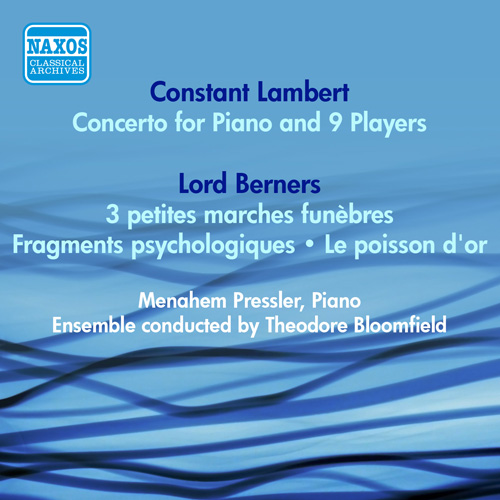Not available in the United States due to possible copyright restrictions. Exclusively available for streaming and download. Not available on CD
LAMBERT, C.: Concerto for Piano and 9 Players / BERNERS, Lord: 3 Petites marches funebres / Fragments psychologiques (Pressler) (1953)
Tracklist
Renzi Jr., Paul (flute)
Duques, Augustin (clarinet)
Glantz, Harry (trumpet)
Starker, Janos (cello)
Bloomfield, Theodore (Conductor)
Renzi Jr., Paul (flute)
Duques, Augustin (clarinet)
Glantz, Harry (trumpet)
Starker, Janos (cello)
Bloomfield, Theodore (Conductor)
Renzi Jr., Paul (flute)
Duques, Augustin (clarinet)
Glantz, Harry (trumpet)
Starker, Janos (cello)
Bloomfield, Theodore (Conductor)
Renzi Jr., Paul (flute)
Duques, Augustin (clarinet)
Glantz, Harry (trumpet)
Starker, Janos (cello)
Bloomfield, Theodore (Conductor)
Lord Berners occupies a very particular position as a notable English eccentric and a talented dilettante in many arts. His literary work includes a series of delightfully libellous novels.
Stage Works
Berners collaborated with Sacheverell Sitwell in a ballet for Diaghilev, The Triumph of Neptune, wrote the music for Luna Park (a ballet commissioned for C.B. Cochran’s London revue of 1930), and also wrote a choral ballet, A Wedding Bouquet, with words by Gertrude Stein. He wrote the ballet Les Sirènes for Covent Garden in 1946, preceded in 1939 by Cupid and Psyche for Sadler’s Wells. His opera Le Carrosse du Saint-Sacrement is a witty treatment of a comedy by Prosper Mérimée, dealing, in rapid French, with the predicament of a viceroy of Peru who provides his mistress with a fine new carriage.
Songs and Piano Music
Lord Berners shows the same wit in his songs, suggesting, for example, that Heine’s Du bist wie eine Blume (‘You are like a flower’) was originally addressed to a white pig. An English song suggests that red noses are preferable, in their durability, to red roses, and there are settings of poems in French. His piano music shows similar wit and deftness in handling musical techniques, with playful or with more serious intention.

The English composer and conductor Constant Lambert was a pupil of Vaughan Williams and a friend of the Sitwells. As a composer he came to be influenced by jazz and in general avoided the insular in a style more akin to that of Paris than London.
Ballets
Lambert won a reputation as a ballet conductor. His ballet scores included Romeo and Juliet for Diaghilev, Pomona for Nijinska, and a number of arrangements.
Choral and Orchestral Music
The Rio Grande for piano, chorus and orchestra, with a libretto by Sacheverell Sitwell, remains Lambert’s best-known concert work, overshadowing his Piano Concerto.































